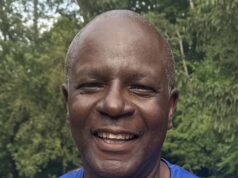Just last Sunday, the James A. Garfield High School Class of 2012 celebrated its commencement exercises, the students officially closing the door on their high school career. Suddenly, all those teachers they spent day after day with were relegated to a file cabinet of high school memories… except for one or two great teachers who truly affected their outlook on life.
A good teacher is effective in transmitting information in such a way that the student is able to receive it, digest it and reinterpret it independently. A truly great teacher reaches beyond this level to effectively transform a student’s way of thinking, even their behavior or moral standards.
Dr. Steven Howell, PhD is one of those great teachers. He goes beyond the realm of teaching English by incorporating difficult subjects in literature which require high school sophomores to grapple with life’s inequities, indignities and prejudices, then formulate patterns of thinking which help them to cope, sympathize and empathize with members of society who are in positions of powerlessness.
Due to his innovative work with students in his Holocaust Literature Unit, Howell will be honored on June 12 in New York City with the 2012 Spirit of Anne Frank Outstanding Educator Award. Along with his wife Kirstein, Howell will be flown to NYC to receive the honor at a prestigious dinner reception hosted by the Anne Frank Center USA, where he will make a short acceptance address.
In honor of the anniversary of Anne Frank’s 83rd birthday on June 12, 2012, The Anne Frank Center honors her effort to improve the world with this award, recognizing individuals who have proven that they have the personal courage to make a difference as educators. The award honors those who encourage students to stand up against racism, prejudice and bias-related violence; embody tolerance in their personal and professional endeavors; and have established cultural or educational programs for excluded groups.
JAG Superintendent Charles Klamer says, “Steven is very modest and humble, and probably will not mention the many other honors he has received for writing. This is in addition to his excellent teaching and his influence with so many of our high school students. He is also very well-respected by his colleagues.”
Anyone who has read Anne Frank: The Diary of a Young Girl (or has seen the play based on Anne’s diary entries) has painfully traced the progression of the Holocaust through the experiences of Anne and her Jewish family as they went into hiding during Hitler’s reign in Germany, during which millions of Jews were exterminated. Although the family was ultimately discovered by the Nazis and sent to die in concentration camps, Anne’s diary was preserved and was later published by her father, who survived internment.
In spite of the atrocities suffered by Anne Frank, she wrote in one of her last diary entries, “In spite of everything, I still believe that people are basically good at heart.”
In addition to reading Anne Frank’s story, Howell’s class also reads WWII history and Elie Wiesel’s Night.
“Then we consider the story of Oscar Schindler (of Schindler’s List) and analyze the ways in which he evolved into a hero,” Howell explains. “I think this helps students realize that not every hero or every great person was born that way. This story really makes them think about that and about what role they might have one day.”
Howell’s students also visit a Holocaust survivor in Cleveland and hear his or her story. “This allows the students a unique opportunity to come face to face with the history and the people they are learning about,” says Howell.
The class also travels to Washington, DC to visit the United States Holocaust Memorial Museum. There, the students write poetry in response to the artifacts they see. Through this writing, students recreate history, and they begin to adopt the voice of victims, or even perpetrators or bystanders.
“By adopting the voice of the other, this not only teaches students about point of view and perspective, it also builds empathy,” Howell explains. “Once students make an effort to sound like someone else, they begin to imagine the feelings of that person, and in many cases, students begin a transition from sympathy to empathy.”
And that’s the objective, even if it’s not immediately evident. As Howell says, “Teaching is a lot like planting; you do your best and hope for great results, but for some, those seeds sit there for a while before the time is right for them to sprout.”

















